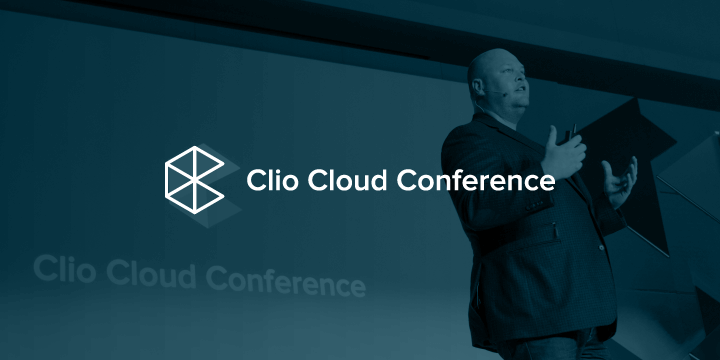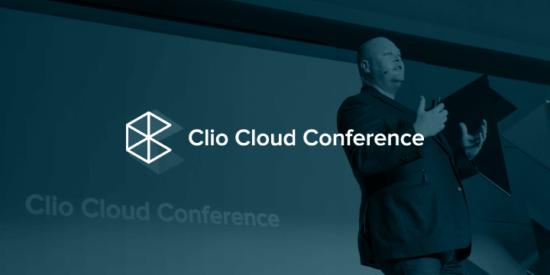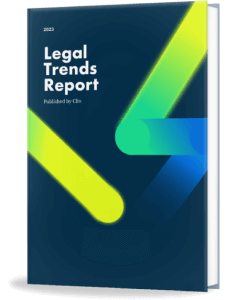Jack Newton, co-founder, and CEO of Clio, kicked off his Clio Cloud Conference 2016 keynote presentation with a selfie to a packed house of 700 attendees—the largest attendance we’ve seen for the conference in the past four years.
Our ambitions are to keep growing this conference year over year. We want it to become the biggest legal event in the world. I think we’ve already succeeded at making it the best legal event in the world. It’s thanks to you for making it such a big success.
Clio Now
Jack began his speech by talking about the history of Clio, and how it began as an idea between him and co-founder Rian Gauvreau. Before Clio, practice management software was prohibitively expensive, cumbersome, and difficult to use—especially for small and solo firms.
Clio now boasts over 150,000 active users across 78 countries … Over 36 terabytes of documents are stored in Clio. That’s roughly equivalent to three Library of Congress’–worth of data that’s stored in Clio’s document management system.
Jack spoke about how Clio has become “the operating system for the modern law firm,” adding that the opportunity to work with so many great practices has given Clio considerable insight into the profession.
We started to understand what a world-class law firm looked like, and how we were able to spread the word around what the best law firms in the world were doing to run better practices. Our relationship with out customers evolved to one where we weren’t just a solution provider anymore. We weren’t just a builder of products, but somebody that became a trusted partner to law firms.
Part of the transformation that is going to start impacting law is in becoming a more data-driven profession. The practice of law isn’t data driven in any way shape or form, but we’ve seen that data insights can reshape industries. We think that’s coming to law, and we want to be part of that story. In fact, we want to drive that story.
Data in Legal
Jack spoke about some of the inherent problems with existing data collection in the legal industry, citing issues of small sample sizes, out-of-date information, and self-reported information—where survey respondents will never have perfect judgment or recall of their actual business practices.
What does being data-driven mean? It’s a bit of a buzzword. Being data-driven is about way more than just a buzzword for a cool new technology. Being data-driven is about leveraging data insights to make better business decisions.
The legal profession is 4,000 years old, dating back to ancient Greece. There’s 4,000 years of data in the legal profession that isn’t being leveraged in any kind of way. Despite the number of years the legal profession has been around, there is a paucity of data.
You may like these posts
Legal Trends Report 2016
What we’re very proud and excited to announce in this keynote, is the inaugural Legal Trends Report from Clio. You can think about the Legal Trends Report as a State of the Union for the Legal Profession. We want this to be the best source of data in the world—and we’re in a position to do this, because we have the most widely-used practice management system in the world. We want to provide these data insights to our customers so that they can make better decisions … We want this to be a benchmark report that provides all of you with useful data to understand how the practice of is law evolving, and how you can adopt some of those learnings into your practice to make it better.
We aggregate and anonymize that data, so that no customer’s data is put at risk, but we get these high-level 10-thousand foot insights on the legal profession that are incredible and fascinating … What we’ll be able to track are [things like], ‘what do lawyers across the United States bill?’ This is the first time we’re able to answer a question like this. The answer is $232 per hour, on average.
We can see that lawyers in Washington DC make more money than any other lawyer in the US with a billable hour of $280. Lawyers in Iowa are the lowest paid in the United States at 120 dollars per hour … What are the top 10 states by billable hour? [Washington] DC is the highest. Nevada is number five. However, when we normalize this data to cost of living, and we talk about these states by real billable hour—as in,‘what’s your real take-home pay?’ Nevada pops to number one and DC drops to number seven.
Legal KPIs
Jack also highlighted average trends for the key performance indicators (KPIs) of utilization (number of actual billable hours in an 8-hour workday), realization (number of hours actually billed for work performed), and collection rate (revenue collected for every dollar billed). The results were sobering.
If you’re an average lawyer—and we assume, probably generously, that there’s an eight-hour workday that we’re working against—the average lawyer is only able to utilize two of those hours to do billable client work. When you have the loss of discounting, that gets shaved down to 1.6 hours. And when you have the 20 percent that’s lost to bad debt on the collections side, on average, you get 1.4 hours of paid time per eight-hour workday.
That’s a statistic that Jack is hoping lawyers can change with insights into the profession from the Legal Trends Report.
Clio Improvements
Jack closed his presentation by announcing new and exciting improvements that Clio users can look forward to in the coming year—and some that they can start using today.
High-speed performance improvements. “We’re re-writing the front end. We’re using a new, high-performance framework to make Clio fast, really fast … We’re using a technology called Angular, developed by Google. What Angular allows us to do is avoid full-page reloads. You’ll be able to navigate Clio, stay on the same page, and avoid any full-page reloads that slow you down over the course of the day.”
Trust Requests feature. “This trust request feature makes one of the most routine but also the most painful parts of bringing a client on board and gives you an opportunity to show them that you’re focusing on an effortless experience making the day-to-day things way easier than they used to be.”
Clio mobile app redesign. Mobile is an area where Clio has seen huge growth. “We’ve seen a 20x increase in mobile-usage in the the last 3 years. And we all know this trend is only going to accelerate.” Starting today, mobile users can download a fully re-designed version of the Clio mobile app, featuring, a new home screen, tabbed browsing, and a new Global Create button.
Advanced tasks. Task assignments now include fields for task type, task status, time estimates, and reporting. “You can see if anything is falling behind. You can track everything as it moves through your workflow. Administrators, for the first time, can get a good top-down view of what’s going on in their practice.”
Clio Apollo
Apollo is the first ever ground-up redesign and rethinking of the Clio web app … What we’ll be sharing with you is the first designs for what that looks like. Internet applications have evolved a lot over the last eight years, and to continue to be the leader in this space, we’ve got to evolve too.
The feel we’re trying to land with this redesign is something that is simple, yet clear. We want an interface that is intuitive, and simply put, every action input in Clio should be obvious. We feel that if you have to pick up the phone and ask us how to do something in Clio, that’s a defect.
For the developers in the room, Clio Apollo will be an API-based backend. Clio’s web app, like Clio’s mobile app, will exclusively use Clio’s version 4 API for everything. If it can be done in Clio, it can be done in the API. That’s huge for developers.
Catch up on other highlights from the Clio Cloud Conference at #ClioCloud9.
We published this blog post in September 2016. Last updated: .
Categorized in: Uncategorized








